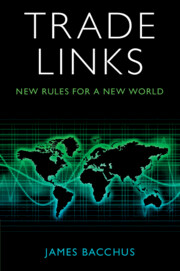52 results
3 - Links to the Pre-pandemic World
-
- Book:
- Trade Links
- Published online:
- 17 February 2022
- Print publication:
- 10 March 2022, pp 94-113
-
- Chapter
- Export citation
Notes
-
- Book:
- Trade Links
- Published online:
- 17 February 2022
- Print publication:
- 10 March 2022, pp 293-378
-
- Chapter
- Export citation
8 - Links to Ecology and a Circular Economy
-
- Book:
- Trade Links
- Published online:
- 17 February 2022
- Print publication:
- 10 March 2022, pp 233-262
-
- Chapter
- Export citation
Conclusion
-
- Book:
- Trade Links
- Published online:
- 17 February 2022
- Print publication:
- 10 March 2022, pp 288-292
-
- Chapter
- Export citation
Index
-
- Book:
- Trade Links
- Published online:
- 17 February 2022
- Print publication:
- 10 March 2022, pp 379-396
-
- Chapter
- Export citation
1 - Links to the Global Economy
-
- Book:
- Trade Links
- Published online:
- 17 February 2022
- Print publication:
- 10 March 2022, pp 16-51
-
- Chapter
- Export citation
9 - Links to Cooperation, Equity, and Inclusion
-
- Book:
- Trade Links
- Published online:
- 17 February 2022
- Print publication:
- 10 March 2022, pp 263-287
-
- Chapter
- Export citation
Introduction
-
- Book:
- Trade Links
- Published online:
- 17 February 2022
- Print publication:
- 10 March 2022, pp 1-15
-
- Chapter
- Export citation
7 - Links to Sustainable Development
-
- Book:
- Trade Links
- Published online:
- 17 February 2022
- Print publication:
- 10 March 2022, pp 204-232
-
- Chapter
- Export citation
Contents
-
- Book:
- Trade Links
- Published online:
- 17 February 2022
- Print publication:
- 10 March 2022, pp vii-viii
-
- Chapter
- Export citation
Copyright page
-
- Book:
- Trade Links
- Published online:
- 17 February 2022
- Print publication:
- 10 March 2022, pp iv-iv
-
- Chapter
- Export citation
Dedication
-
- Book:
- Trade Links
- Published online:
- 17 February 2022
- Print publication:
- 10 March 2022, pp v-vi
-
- Chapter
- Export citation
2 - Links to the Pandemic
-
- Book:
- Trade Links
- Published online:
- 17 February 2022
- Print publication:
- 10 March 2022, pp 52-93
-
- Chapter
- Export citation
4 - Links to the Trade Inheritance
-
- Book:
- Trade Links
- Published online:
- 17 February 2022
- Print publication:
- 10 March 2022, pp 114-136
-
- Chapter
- Export citation
6 - Links to Climate Change
-
- Book:
- Trade Links
- Published online:
- 17 February 2022
- Print publication:
- 10 March 2022, pp 173-203
-
- Chapter
- Export citation
5 - Links to the New Commercial Economy
-
- Book:
- Trade Links
- Published online:
- 17 February 2022
- Print publication:
- 10 March 2022, pp 137-172
-
- Chapter
- Export citation

Trade Links
- New Rules for a New World
-
- Published online:
- 17 February 2022
- Print publication:
- 10 March 2022
Contents
-
- Book:
- The Willing World
- Published online:
- 29 June 2018
- Print publication:
- 19 July 2018, pp vii-viii
-
- Chapter
- Export citation
4 - On the Necessity of the International Rule of Law for Effective Global Economic and Environmental Governance
- from Part I - On What We Hope to Do
-
- Book:
- The Willing World
- Published online:
- 29 June 2018
- Print publication:
- 19 July 2018, pp 61-78
-
- Chapter
- Export citation
Preface
-
- Book:
- The Willing World
- Published online:
- 29 June 2018
- Print publication:
- 19 July 2018, pp ix-xii
-
- Chapter
- Export citation



